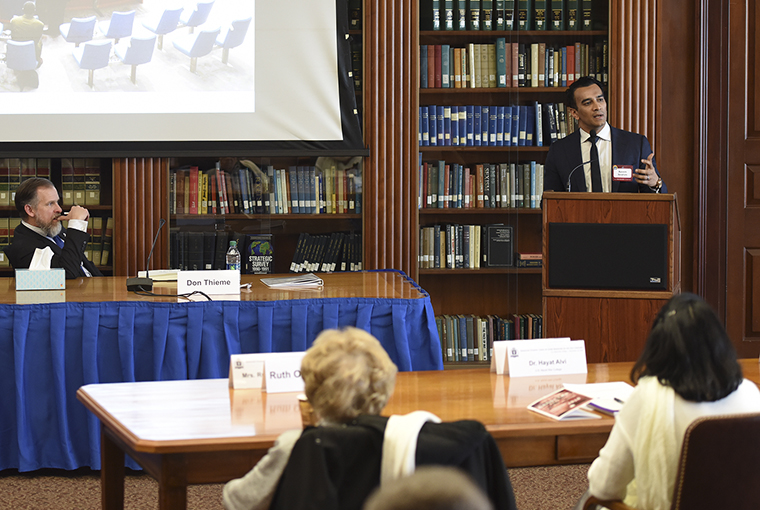U.S. Naval War College hosts its first conference examining genocide

NEWPORT, RI—With accounts of human atrocities in Myanmar, Bangladesh and elsewhere dotting the news, scholars gathered at U.S. Naval War College on Dec. 19 to discuss the concept of “slow genocide” and how it might be addressed.
The “Cases of Slow Genocide in the 21st Century” conference—the college’s first event focused on genocide—looked at how specific examples of intolerance have arisen and examined the obstacles to forming an international response.
Organizer Hayat Alvi, associate professor in the college’s Department of National Security Affairs, said the purpose was to shed light on current situations that rise to the level of genocide though they have built over a number of years at a lower intensity.
“Everyone understood coming away from the conference that slow genocide is happening even in the 21st century,” Alvi said afterward.
“The examples that the scholars gave individually tell us that there are a number of genocides happening today that are not even on the radar of the news media or the consciousness of the public at large.”
The Naval War College is an appropriate place to address this topic because the college studies not only warfare but the prevention of war, said Rear Adm. Jeffrey Harley, college president, in his opening remarks.
“The value of studying this is the simple recognition that we cannot let these types of things happen again,” Harley said.
Ruth Oppenheim, who lived through the Nazi Kristallnacht pogrom against German Jews in November 1938, spoke to the group about the long-term effects on her and her family even after they escaped to the United States.
Oppenheim, an 11-year-old girl during the two-day Kristallnach attacks, said the memory of that trauma has haunted her, even though she didn’t allow herself to be introspective about the horrors she witnessed until much later in life.
“With child-bearing and career pursuits, I did not focus on introspection. Only later, alone with time to think and contemplate, did I realize how trauma has affected my life, and I regret that it must have had an effect on my children.”
Panelist Don Thieme said governments often struggle when faced with decisions surrounding when and how to react to ongoing but low-level atrocities.
“Slow genocides may in fact be harder for decision makers to deal with effectively,” said Thieme, a retired Marine Corps officer who served as theater campaigns chief for U.S Central Command.
“If it is a sustained insurrection, at what point do external actors decide to apply force? It is not an insignificant question, and it is a devilish decision,” Thieme said.
Focusing on the Rohingya Muslim minority in Myanmar, professor and author Azeem Ibrahim said this group might be the most persecuted minority in history but the larger world isn’t yet paying enough attention.
One reason is that widespread lack of education has left the Rohingyas unable to advocate for themselves, said Ibrahim, a research professor at the U.S. Army War College’s Strategic Studies Institute.
And they don’t yet have a champion willing to take up their cause, he said.
“I bet not a single one of you can name a single Rohingya person,” Ibrahim told the audience.
“There is nobody of Rohingya origin in Silicon Valley who can say, ‘I’m going to give $5 million of my own money for a public awareness campaign for my people.’ There is nobody of Rohingya origin at the BBC or CNN who can take this on as a pet project.”
Panelist David Cotter described the ongoing violence and systemic rape campaign against Hindus by the Muslim majority in Bangladesh.
Over decades, the situation has prompted millions of Hindus to flee to neighboring India.
“This is an example of a slow-burning event, but because of the geographic shift, it more aptly fits, in my opinion, into the definition of ethnic cleansing,” said Cotter, who is acting director of the Department of Military History at the U.S. Army Command and General Staff College.
“I don’t think you’d ever get United Nations agreement that the numbers of deaths are enough to cross the genocide threshold. And there’s a very good chance it will not get any international action.”
Alvi said she expects the conference on genocide to become an annual event with diverse themes each year.
